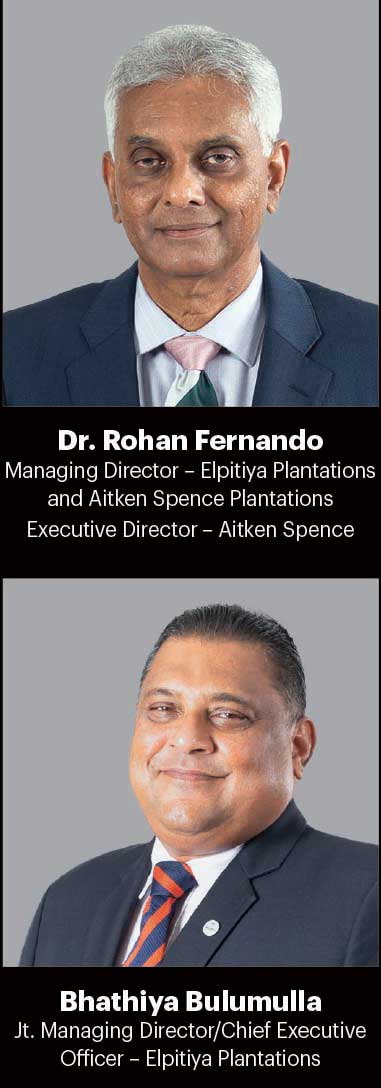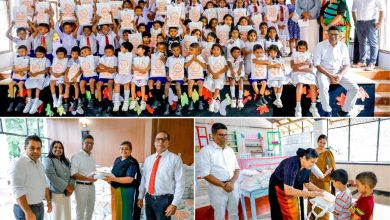 As a pioneer in agriculture and plantations, and leading manufacturer of premium tea, Elpitiya Plantations understands the importance of upholding corporate respect – not only in times of crisis but as a continuous commitment to all its stakeholders. The company prioritises several facets to earn corporate respect, from its sustainability strategy to being transparent with corporate governance principles. Similarly, it is committed to establishing sustainable businesses that provide solutions to local and global development needs, ensuring environmental and social impact control, and positive value creation.
As a pioneer in agriculture and plantations, and leading manufacturer of premium tea, Elpitiya Plantations understands the importance of upholding corporate respect – not only in times of crisis but as a continuous commitment to all its stakeholders. The company prioritises several facets to earn corporate respect, from its sustainability strategy to being transparent with corporate governance principles. Similarly, it is committed to establishing sustainable businesses that provide solutions to local and global development needs, ensuring environmental and social impact control, and positive value creation.
Q: What mechanisms do you have in place to ensure employees’ voices are heard and respected?
Dr. R. M. Fernando (RMF): The board of directors considers our workforce as the collective intellect of over 5,000 employees. We believe it is up to us to leverage this vast pool of knowledge to operate the organization effectively. This is the secret of our success.
B. Bulumulla (BB): This method gives anyone the space to come forward and express or share their ideas. Some of these ideas are then implemented company-wide.
We also have an open-door policy for everyone from top management to floor staff, and have set up feedback boxes for people to share their concerns anonymously. We believe in being transparent with all our stakeholders, not only employees.

Q: Given the volatile business environment, how costly is it to earn and maintain corporate respect today?
RMF: Maintaining corporate respect is important not only in a volatile business environment but consistently and systemically. Last year, we were proud to become one of the best corporate citizens among all the big businesses.
We achieved this because we value how our stakeholders see us. Corporate respect also has to do with your employees and ensuring that their voices are heard.
Q: Is ESG claiming sufficient space in the ‘corporate respect’ equation?
BB: The focus on ESG has increased considerably among stakeholders. There is now greater emphasis on an entity’s overall effect on the environment.
We have studied our sustainability priorities, aligned with the applicable sustainable development goals and integrated practices in our plantation operations, from preserving the environment and harvesting rainwater to adopting green energy.
Now, we generate 160 per cent of our grid electricity requirement through solar panels. As an example of our interventions for social sustainability, we are the only company in Sri Lanka that maintains a retired workers home for former plantation employees.
Another initiative dear to our hearts is providing a meal a day to all our workers, recognising that everyone is facing difficulties in this current economic climate. Even during the COVID-19 pandemic, we cultivated vegetables and fruits on every estate, which were distributed among the workers.
We also support families who care for children with special needs, widows and orphans by routinely distributing dry rations and stationery.
RMF: ESG frameworks check how businesses perform on identified sustainability priorities. Corporates need to look beyond ESG and ensure the business model itself is sustainable.
Q: How important is it that corporates should continuously innovate as a means of garnering respect?
BB: Continuous innovation is vital for any organisation to earn respect as it demonstrates adaptability, a forward-thinking mindset and the ability to meet evolving market demands.
Despite being a traditional plantation company, we focus a lot on innovation. We have a 50 per cent partnership with a research company that conducts R&D for the plantation sector. It has already introduced innovations such as using drones and electronic sensors for key indicators to aid precision agriculture, eliminate waste and increase efficiency. We were one of the first to utilise these drones in spraying chemicals and fertilisers.
Tea plantation is a 150-year-old industry and all documentation regarding the industry has been written in books over time. We digitalised this whole operation for the first time in the history of plantations, and total field operations have gone paperless. All our staff are now trained to access this information over their smartphones and other devices.
Sustainability, ESG and corporate governance frameworks are part and parcel of its business model and forward strategy for Elpitiya Plantations. It is this commitment to its stakeholders – employees, partners and customers alike – that has garnered the position the company enjoys today.

SECTOR WINNER PLANTATIONS
QUICK-FIRE ROUND
Three priorities for Sri Lankan corporates today
Corporate sustainability
Consistency in policy
Business transformation – being innovative in this very challenging environment
Three most vital professional values for business leaders
Honesty and integrity
Managerial skills to handle complex situations
Authenticity and empathy


